I’m excited to share with you how I reduce waste with bamboo toilet paper.
In this step-by-step guide, I’ll show you the environmental impact of traditional toilet paper and why bamboo toilet paper is a sustainable choice.
We’ll also explore how it helps reduce deforestation and the benefits of using it for waste reduction.
I’ll provide tips on choosing the right brand, proper disposal, and even composting for maximum waste reduction.
Let’s make a positive change together!
The Environmental Impact of Traditional Toilet Paper

Using traditional toilet paper contributes to the environmental degradation caused by deforestation and excessive water usage. As individuals, we may not realize the impact our daily bathroom practices have on the environment. However, by understanding the importance of sustainable bathroom practices and exploring alternative toilet paper options, we can make a significant difference.
Traditional toilet paper is typically made from virgin wood pulp, which requires the cutting down of trees. This contributes to deforestation and the destruction of natural habitats for countless species. Additionally, the production process for traditional toilet paper uses large amounts of water, further straining our already limited water resources.
Fortunately, there are alternative toilet paper options available that are more environmentally friendly. One such option is bamboo toilet paper. Bamboo is a fast-growing plant that can be harvested sustainably without causing deforestation. It also requires significantly less water to grow compared to trees used for traditional toilet paper.
By switching to bamboo toilet paper, we can reduce our ecological footprint and promote sustainable bathroom practices. It’s a simple yet impactful change that can help preserve our natural resources and protect the environment for future generations.
Why Bamboo Toilet Paper Is a Sustainable Choice
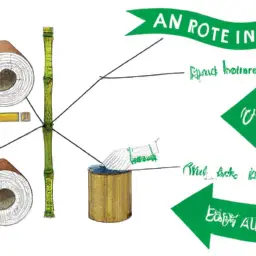
Because bamboo toilet paper is made from a renewable resource and requires less water to produce, it’s a sustainable choice for reducing waste and protecting the environment. Bamboo, a type of grass, is one of the fastest-growing plants on Earth. Unlike traditional toilet paper, which is made from trees that take many years to grow, bamboo can be harvested and regrown within just a few years. This makes bamboo a highly renewable resource, ensuring a continuous supply for toilet paper production.
Furthermore, bamboo toilet paper production requires significantly less water compared to traditional toilet paper production. Bamboo plants are naturally drought-resistant and require minimal irrigation. Additionally, bamboo has a higher water-use efficiency, meaning it can produce more fiber per unit of water compared to trees. This helps to conserve water resources and reduce the strain on freshwater ecosystems.
How Bamboo Toilet Paper Helps Reduce Deforestation
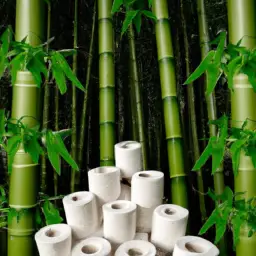
Opting for bamboo toilet paper helps in reducing deforestation while promoting sustainability. Deforestation has a significant impact on our environment, leading to the loss of countless trees and the destruction of habitats for various species. Traditional toilet paper production relies heavily on wood pulp sourced from trees, contributing to deforestation rates around the world. However, by choosing bamboo alternatives, we can help mitigate this issue.
Bamboo is a fast-growing and renewable resource that can be harvested without causing any harm to the plant itself. It can reach maturity in just a few years, making it a highly sustainable option for toilet paper production. Unlike trees, bamboo can be harvested without killing the plant, allowing it to regrow quickly and continue absorbing carbon dioxide from the atmosphere.
The Benefits of Using Bamboo Toilet Paper for Waste Reduction
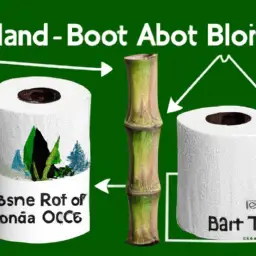
I love bamboo toilet paper because it reduces waste and helps the environment. Not only does it provide numerous benefits for personal hygiene, but it also offers an affordable option compared to other eco-friendly alternatives. Let’s take a closer look at the advantages of using bamboo toilet paper for waste reduction.
| Benefits of Bamboo Toilet Paper | Emotional Response |
|---|---|
| 1. Sustainable and Renewable | Feeling of Relief |
| 2. Biodegradable | Sense of Responsibility |
| 3. Soft and Gentle | Comfort and Satisfaction |
| 4. Hypoallergenic | Peace of Mind |
| 5. Cost-effective | Financial Relief |
Using bamboo toilet paper contributes to waste reduction because bamboo is a highly sustainable and renewable resource. Unlike traditional toilet paper made from trees, bamboo grows much faster, making it a more environmentally friendly option. Moreover, bamboo toilet paper is biodegradable, meaning it breaks down easily and reduces the strain on landfills.
In terms of personal hygiene, bamboo toilet paper offers a soft and gentle texture, providing comfort and satisfaction during use. It is also hypoallergenic, making it suitable for those with sensitive skin or allergies. This aspect brings peace of mind and ensures a pleasant experience for everyone.
Furthermore, bamboo toilet paper is an affordable option compared to other eco-friendly alternatives. It allows individuals to make a positive impact on the environment without breaking the bank. By choosing bamboo toilet paper, you can reduce waste, take care of your personal hygiene, and do so at an affordable price.
Step 1: Choosing the Right Bamboo Toilet Paper Brand
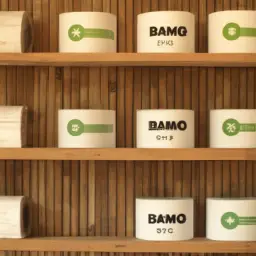
When searching for the right bamboo toilet paper brand, I recommend considering factors such as quality, sustainability, and value for money. Choosing sustainable brands is essential to reduce waste and minimize our impact on the environment.
Bamboo toilet paper is a great alternative to traditional paper made from trees, as bamboo is a highly renewable resource that grows quickly and requires fewer resources to produce.
When comparing bamboo toilet paper to recycled toilet paper, there are a few key differences to consider. While both options are more eco-friendly than regular toilet paper, bamboo toilet paper tends to be softer and more absorbent. This is because bamboo fibers are naturally longer and stronger than recycled paper fibers. Additionally, bamboo toilet paper is often whitened using a chlorine-free process, which is gentler on the environment compared to the bleaching process used for recycled paper.
To ensure you choose a sustainable brand, look for certifications such as FSC (Forest Stewardship Council) or Rainforest Alliance. These certifications indicate that the bamboo used in the production of the toilet paper is responsibly sourced and managed.
It’s also worth considering packaging materials – opt for brands that use minimal or plastic-free packaging. Finally, don’t forget to compare prices and find a brand that offers good value for money without compromising on quality or sustainability.
Step 2: Proper Disposal of Bamboo Toilet Paper
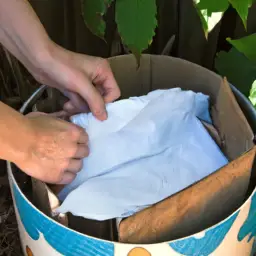
The proper disposal of bamboo toilet paper is an important step in reducing waste and promoting sustainability. After using bamboo toilet paper, it’s crucial to know the proper disposal methods to ensure that it can be recycled and reused.
One of the easiest ways to dispose of bamboo toilet paper is by placing it in a recycling bin. Many recycling centers accept bamboo toilet paper as it’s biodegradable and can be processed into new paper products. However, it’s essential to check with your local recycling facility to confirm their specific guidelines for recycling bamboo toilet paper.
Another option for proper disposal is composting. Bamboo toilet paper is compostable, and when it breaks down, it becomes a valuable soil amendment. If you have a compost pile or access to a composting service, you can simply add the used toilet paper to your compost bin.
Step 3: Composting Bamboo Toilet Paper for Maximum Waste Reduction

To achieve maximum waste reduction, it is important to compost bamboo toilet paper properly. Composting is a natural process that breaks down organic waste into nutrient-rich soil. By composting bamboo toilet paper, we can divert it from landfills and create a valuable resource for our gardens.
Composting offers several benefits. Firstly, it reduces the amount of waste that ends up in landfills, helping to minimize methane emissions and the release of harmful greenhouse gases. Secondly, it enriches the soil with organic matter, improving its structure, moisture retention, and nutrient content. Lastly, composting reduces the need for chemical fertilizers, promoting a more sustainable and eco-friendly gardening practice.
To compost bamboo toilet paper effectively, follow these techniques:
| Step | Technique |
|---|---|
| 1 | Collect bamboo toilet paper in a compost bin or pile. |
| 2 | Mix it with other compostable materials such as food scraps, yard waste, and shredded paper. |
| 3 | Maintain the right balance of carbon and nitrogen by adding dry materials like leaves or straw. |
| 4 | Regularly turn the compost pile to aerate it and speed up decomposition. |
Remember to keep the compost moist and monitor its temperature to ensure optimal conditions for decomposition. By composting bamboo toilet paper, we can close the loop and contribute to a more sustainable and waste-free future.
Additional Tips and Tricks for Waste Reduction With Bamboo Toilet Paper
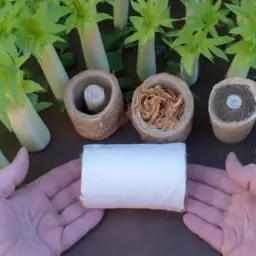
For waste reduction with bamboo toilet paper, I recommend using reusable cloth wipes in addition to bamboo toilet paper. Not only will this further decrease your waste, but it will also save you money in the long run. Cloth wipes can be easily made at home through simple DIY projects, and they can be used for a variety of alternative purposes as well.
One alternative use for cloth wipes is as a replacement for disposable facial wipes or makeup remover wipes. By dampening a cloth wipe with water or a gentle cleanser, you can effectively remove makeup or cleanse your face without creating any additional waste.
Cloth wipes can also be used as an eco-friendly alternative to paper towels. They’re great for wiping down surfaces, cleaning spills, or even as napkins during meals. Simply toss them in the wash after use and they’re ready to be used again.
Additionally, cloth wipes can be used for baby care. They’re gentle on delicate skin and can be used for diaper changes or wiping up messes. By using cloth wipes instead of disposable baby wipes, you can significantly reduce waste and save money.
Incorporating reusable cloth wipes into your routine alongside bamboo toilet paper is a simple and effective way to further reduce waste and live a more sustainable lifestyle. With a little creativity, you can find many alternative uses for cloth wipes and contribute to a greener future.
Conclusion
In conclusion, making the switch to bamboo toilet paper is a simple and effective way to reduce waste and help protect the environment. By choosing the right brand, properly disposing of the toilet paper, and even composting it, we can maximize waste reduction.
With the added benefits of reducing deforestation and using a sustainable resource, bamboo toilet paper is a smart choice for a greener future.

